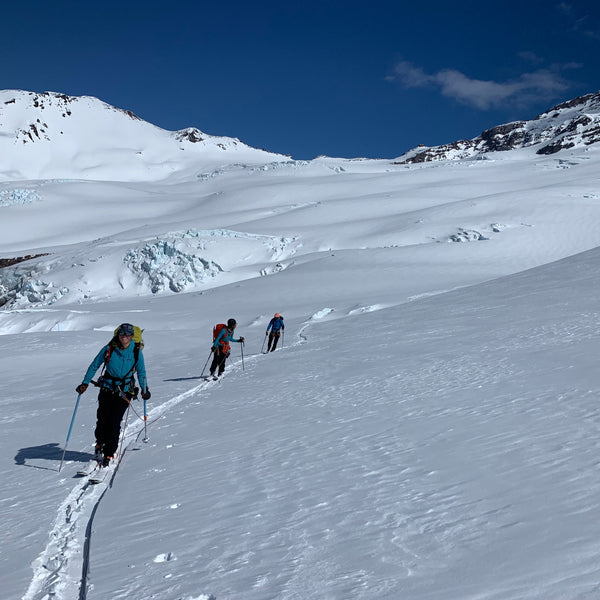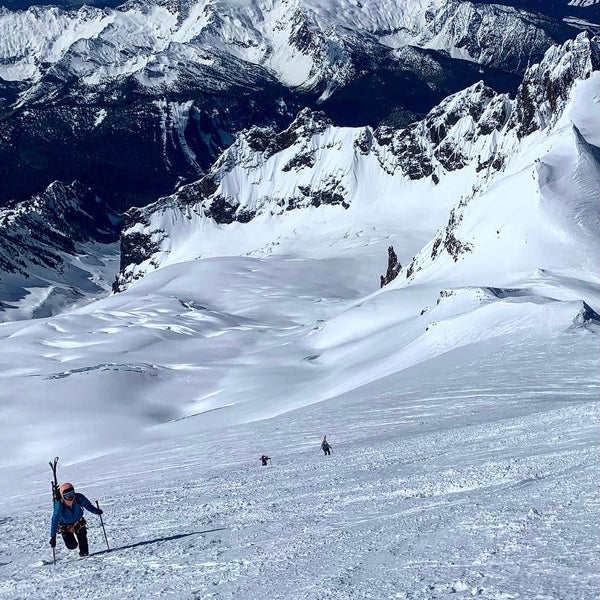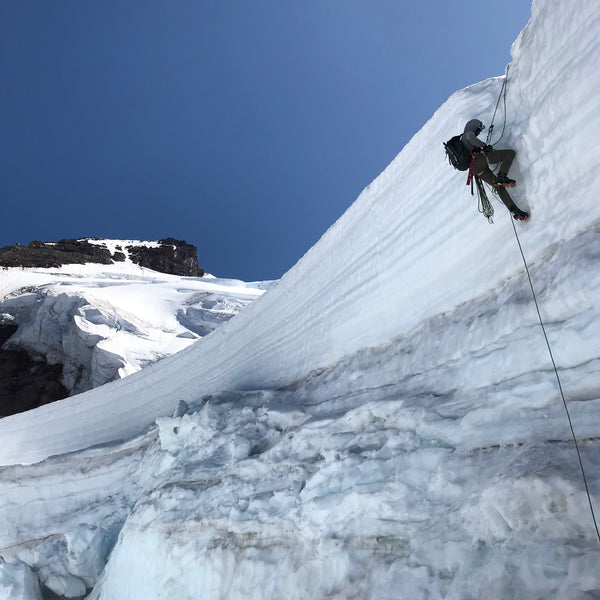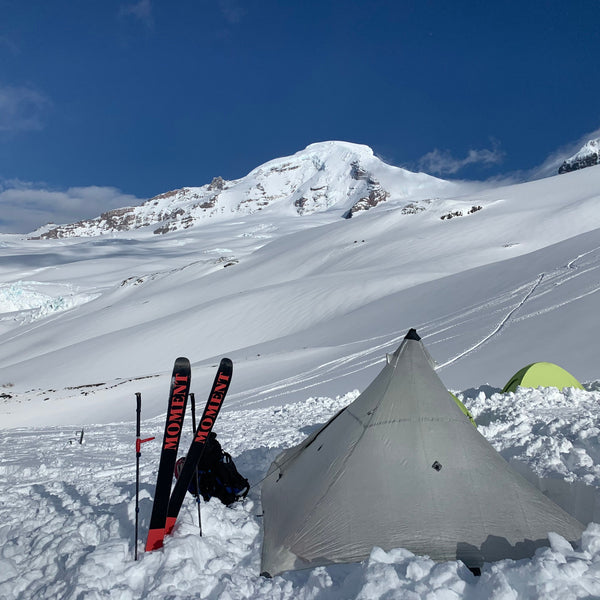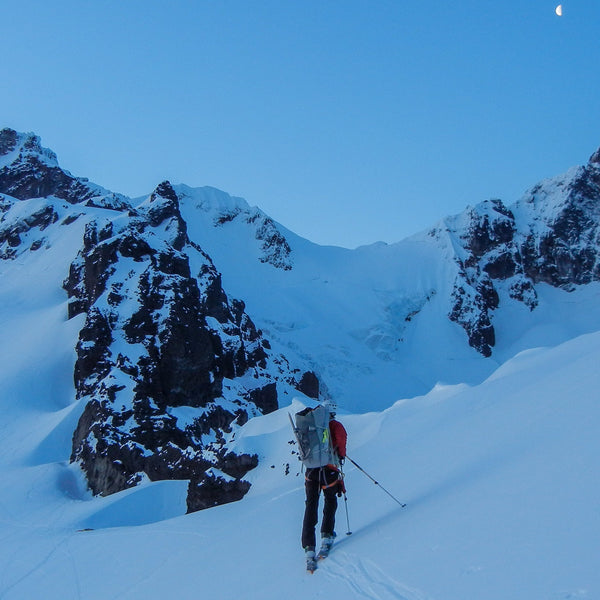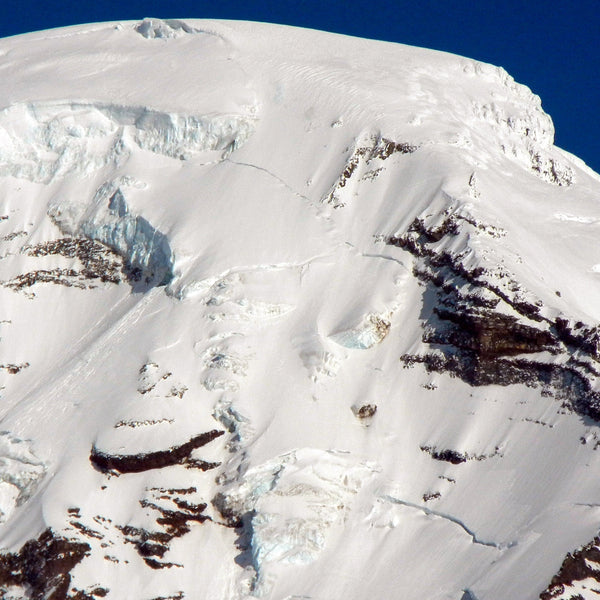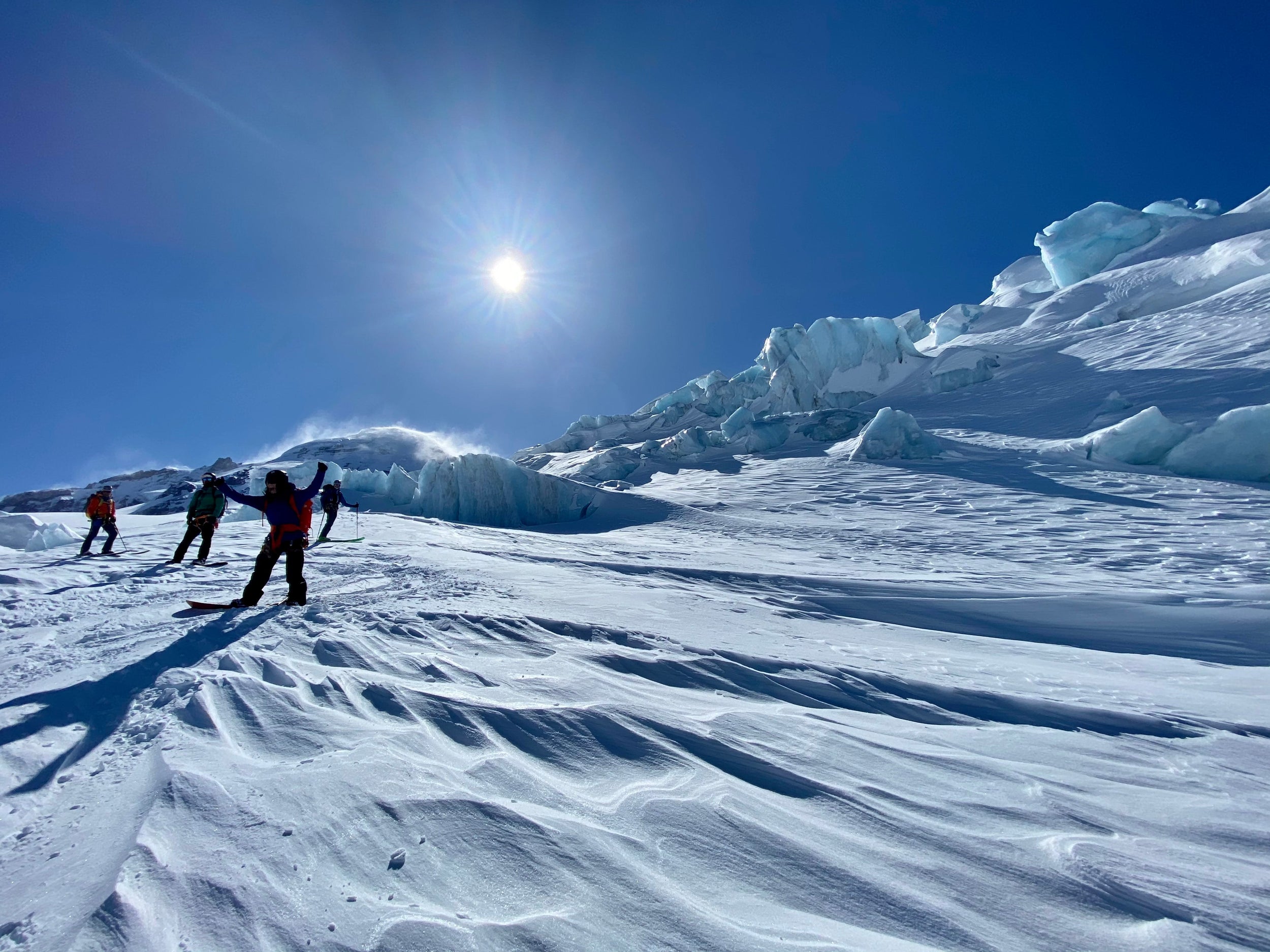
Mt Baker Ski Mountaineering Camp 5 Day
This 5-day Mt. Baker Ski Mountaineering Camp goes beyond simply teaching techniques—it immerses you in the full experience of a big mountain expedition. You’ll learn how to plan and execute summit pushes, manage changing weather and snow conditions, and practice effective group communication in high-consequence terrain. In addition to honing technical skills like rope systems, crevasse rescue, and steep skiing, you’ll gain valuable insights into expedition layering, camp setup in glaciated environments, and efficient movement strategies on long summit days. With AMGA-trained guides providing feedback and coaching throughout, you’ll leave with not just the skills but the judgment, experience, and confidence needed to take on bigger ski mountaineering goals on Mt. Rainier, Denali, and remote peaks around the world.
We'll tackle the following objectives and skills:
- Push Your Limits - Take your alpine climbing to the next level on this glaciated Cascades volcano!
- Route Options Include - Coleman-Deming and Easton / Squawk Glacier Routes.
- Mountaineering Skills Training - Including crampons, ice axe arrest and glacier rope travel
- Summit Attempt - This will be a long day, gaining over 4,000’ of elevation over various snow surfaces and steep slopes.
- Descent - Once we reach our high point, we’ll descend the route back down to camp
This program requires at least 2 participants to run.
----------Want more info about skiing Mt Baker?
For details on routes, timing, gear & pro tips for a safe, epic glacier descent on one of North America’s best ski peaks, check out our 📄 Ultimate Guide to Skiing Mt. Baker.
Here's the schedule for your trip:
Day 1 - Travel to & Set Up Camp
Meet your guide at the trailhead. We'll do a quick gear check and review the plan for the day. The guide will discuss the route up to camp and we'll make any last minute adjustments needed. Learn winter/glacier camp craft and how to camp comfortably in the snow.
Day 2 - Glacier Travel Skills - Review of equipment necessary for safe glacier travel. Learn and conduct a crevasse rescue in an actual crevasse if conditions allow. In this course we'll cover:
- Mountaineering Gear
- Ice Axe Techniques including Self Arrest and
- Team Arrest (for Glacier Travel)
- Crampon Techniques
- Mountaineering efficiency including the Rest Step
- Descending techniques for mountaineering
- Basics of rope team travel
In the evening, we'll prepare an early dinner and head to bed
Conduct a short evening tour and ski touring skills refinement.
Day 3 - Alpine Climbing Skills for Ski Mountaineering
Intro to alpine climbing techniques used in ski mountaineering including:
- Belays
- Movement
- Protection
Instructor led glacial tour & glaciology lecture to understand how glaciers work.
Day 4 - Alpine Start - Instructor led glacial tour or summit attempt of Mt. Baker depending on weather, conditions, and group desires.
Day 5 - Student Led Glacial Tour - All students get time out front to lead the group and solve problems and get feedback.
Here are the skills and fitness you'll need for your course:
- Expert Resort Riding Skills - Including steep and consequential off-piste terrain in challenging snow conditions.
- Advanced Backcountry Riding Skills - Including efficient gear management, skinning, transition technique, with 30+ days of backcountry experience.
- Basic Ski Mountaineering Skills - Including ice axe, crampon, and basic rope skills are encouraged, but not required. Build those skills during the program or attend our Ski Mountaineering Skills course prior to attending.
- Strong Fitness - Able to spend a long, active day outside, moving uphill at 1,000’ per hour for durations of 1-1.5 hours between breaks. Participants should be able to hike 8-10 miles, climbing 2,500 - 3,500 vertical feet throughout the course of the day. People with strong fitness typically have a strenuous workout 3-4 days a week.
- Ski/Split Touring, Avalanche, & Ski Mountaineering Gear - Come prepared with your own gear or rent from us
Here's what's included with your trip:
- Experienced AMGA Trained Guide
- Ropes & Gear - for ski mountaineering training
- Tent
- Stove & Fuel
- Group Safety Gear - your guide will be equipped with snow science tools and a first aid kit
- Wag Bags - for human waste disposal in with compliance 'Leave No Trace' principles
- Meals
- Ski/Splitboard Gear
- Avalanche Gear
- Ice Axe, Crampons, Climbing Harness
- Guide Gratuities
Washington Ski Mountaineering Gear List
- Avalanche Gear - Come prepared with your own gear or rent from Blackbird
- Ski/Split Touring Gear - Come prepared with your own gear or rent from:
Know Before you go

PRIVATE PROGRAMS
- Custom Scheduling: Choose your dates and plan around your availability.
- Tailored Experiences: Itineraries and objectives are adjusted to suit your goals, experience, and fitness.
- Cost-Effective for Most Large Groups: Private programs are typically more cost-effective for groups of 3 or more.
- Flexibility Comes at a Price: For groups of 1-2, private programs are generally more expensive.
- AIARE Courses: AIARE course pricing is based on a group of 6. Running these as a private program with fewer than 6 participants will increase the per-person cost.
SCHEDULED PROGRAMS
- Fixed Dates & Costs: Scheduled programs have set dates, itineraries, objectives, and pricing.
- Great for Solo or Small Groups: Ideal for individuals or small groups looking to share costs with others.
- Affordable for 1-2 People: Scheduled programs are typically less expensive for groups of 1-2.
- Less Flexibility: Dates fill quickly, and group programs require adapting to the skill level and pace of all participants
- Group Atmosphere: Meet others with similar interests and make some new backcountry buddies!
Note: Any scheduled program can also be run as a private program with customized dates and rates.
Both options offer exceptional guiding and experiences. Choose what works best for you!
This is a typical itinerary for this program and is subject to change. As guides, we do our best to adhere to the schedule described below, but the mountains are a dynamic environment that requires flexibility. We may need to shift the summit day or some of the skills sessions to achieve the best learning outcomes or give ourselves a better chance at the summit.
Day 1
8:00am Meet your guide at the trailhead. We'll do a gear check and review the plan for the day. The guide will discuss the route up to camp and we'll make any last-minute adjustments needed. The guide will conduct a Trailhead Departure Check/Beacon Check.
8:30am Start the ascent to camp and on arrival we'll cover strategy for where to set camp and how to build a camp in snow or on rock that will be able to endure the elements that the mountains .
Day 2
Snow School
We'll learn all of the critical skills for moving up and down snow safely and efficiently. These skills are useful for any snow-covered mountain terrain, and we'll finish the day with a lesson geared toward glacier rope team travel.
- Ski Mountaineering Gear (Ice Axes, Crampons, Harnesses, Ropes, Carabiners, etc)
- Mountaineering efficiency including the kicking steps, the Rest Step, Crampon Techniques
- Ice Axe Techniques including Self Arrest and Team Arrest (for Glacier Travel)
- Descending techniques for mountaineering
- Basics of rope team travel (both glacier intervals and short roping)
- Mountaineering Knots and basic Mechanical Advantage Systems (this may be covered at camp)
Dinner and bed.
Day 3
Crevasse Rescue.
We'll find an appropriate crevasse, with a vertical or nearly vertical wall to practice crevasse rescue. With our foundation of knots and basic mechanical advantage systems, we'll dive into performing a crevasse rescue. We'll manage the crevasse hazard using a
Early Dinner and bed.
We’ll review the plan for our summit attempt before we prepare our gear and get to bed early.
Day 4
Alpine Start.
Your guides will set the wake-up time based on the weather forecast and the hazards for the day. We'll have hot drinks and a warm breakfast before starting off for the summit.
Summit Attempt.
We'll start toward the summit with 4,000' of snow and glaciated terrain between us and the top. This is a demanding day, and we may have to push through inclement weather or less-than-ideal conditions to make the summit.
Ski Descent.
Once we reach our high point, we’ll descend the lines with the best snow! We'll return to camp for a hot dinner and discussion of more mountaineering skills including knots.
Day 5
Pack up camp and return to trailhead.
We’ll break down camp, pack up our bags and descend to the trailhead. We’ll aim to be down by early afternoon.
Time permitting, we'll may attempt to get in a minor ski objective.
This 5-day Mt. Baker Ski Mountaineering Camp goes beyond simply teaching techniques—it immerses you in the full experience of a big mountain expedition. You’ll learn how to plan and execute summit pushes, manage changing weather and snow conditions, and practice effective group communication in high-consequence terrain. In addition to honing technical skills like rope systems, crevasse rescue, and steep skiing, you’ll gain valuable insights into expedition layering, camp setup in glaciated environments, and efficient movement strategies on long summit days. With AMGA-trained guides providing feedback and coaching throughout, you’ll leave with not just the skills but the judgment, experience, and confidence needed to take on bigger ski mountaineering goals on Mt. Rainier, Denali, and remote peaks around the world.
We'll tackle the following objectives and skills:
- Push Your Limits - Take your alpine climbing to the next level on this glaciated Cascades volcano!
- Route Options Include - Coleman-Deming and Easton / Squawk Glacier Routes.
- Mountaineering Skills Training - Including crampons, ice axe arrest and glacier rope travel
- Summit Attempt - This will be a long day, gaining over 4,000’ of elevation over various snow surfaces and steep slopes.
- Descent - Once we reach our high point, we’ll descend the route back down to camp
This program requires at least 2 participants to run.
----------Want more info about skiing Mt Baker?
For details on routes, timing, gear & pro tips for a safe, epic glacier descent on one of North America’s best ski peaks, check out our 📄 Ultimate Guide to Skiing Mt. Baker.
Here's the schedule for your trip:
Day 1 - Travel to & Set Up Camp
Meet your guide at the trailhead. We'll do a quick gear check and review the plan for the day. The guide will discuss the route up to camp and we'll make any last minute adjustments needed. Learn winter/glacier camp craft and how to camp comfortably in the snow.
Day 2 - Glacier Travel Skills - Review of equipment necessary for safe glacier travel. Learn and conduct a crevasse rescue in an actual crevasse if conditions allow. In this course we'll cover:
- Mountaineering Gear
- Ice Axe Techniques including Self Arrest and
- Team Arrest (for Glacier Travel)
- Crampon Techniques
- Mountaineering efficiency including the Rest Step
- Descending techniques for mountaineering
- Basics of rope team travel
In the evening, we'll prepare an early dinner and head to bed
Conduct a short evening tour and ski touring skills refinement.
Day 3 - Alpine Climbing Skills for Ski Mountaineering
Intro to alpine climbing techniques used in ski mountaineering including:
- Belays
- Movement
- Protection
Instructor led glacial tour & glaciology lecture to understand how glaciers work.
Day 4 - Alpine Start - Instructor led glacial tour or summit attempt of Mt. Baker depending on weather, conditions, and group desires.
Day 5 - Student Led Glacial Tour - All students get time out front to lead the group and solve problems and get feedback.
Here are the skills and fitness you'll need for your course:
- Expert Resort Riding Skills - Including steep and consequential off-piste terrain in challenging snow conditions.
- Advanced Backcountry Riding Skills - Including efficient gear management, skinning, transition technique, with 30+ days of backcountry experience.
- Basic Ski Mountaineering Skills - Including ice axe, crampon, and basic rope skills are encouraged, but not required. Build those skills during the program or attend our Ski Mountaineering Skills course prior to attending.
- Strong Fitness - Able to spend a long, active day outside, moving uphill at 1,000’ per hour for durations of 1-1.5 hours between breaks. Participants should be able to hike 8-10 miles, climbing 2,500 - 3,500 vertical feet throughout the course of the day. People with strong fitness typically have a strenuous workout 3-4 days a week.
- Ski/Split Touring, Avalanche, & Ski Mountaineering Gear - Come prepared with your own gear or rent from us
Here's what's included with your trip:
- Experienced AMGA Trained Guide
- Ropes & Gear - for ski mountaineering training
- Tent
- Stove & Fuel
- Group Safety Gear - your guide will be equipped with snow science tools and a first aid kit
- Wag Bags - for human waste disposal in with compliance 'Leave No Trace' principles
- Meals
- Ski/Splitboard Gear
- Avalanche Gear
- Ice Axe, Crampons, Climbing Harness
- Guide Gratuities
Washington Ski Mountaineering Gear List
- Avalanche Gear - Come prepared with your own gear or rent from Blackbird
- Ski/Split Touring Gear - Come prepared with your own gear or rent from:
the blackbird difference
We’re here to help. Our FAQs or Gear Lists might have the information you’re seeking. But If you’re not finding the information you need, we’d be happy to help!
